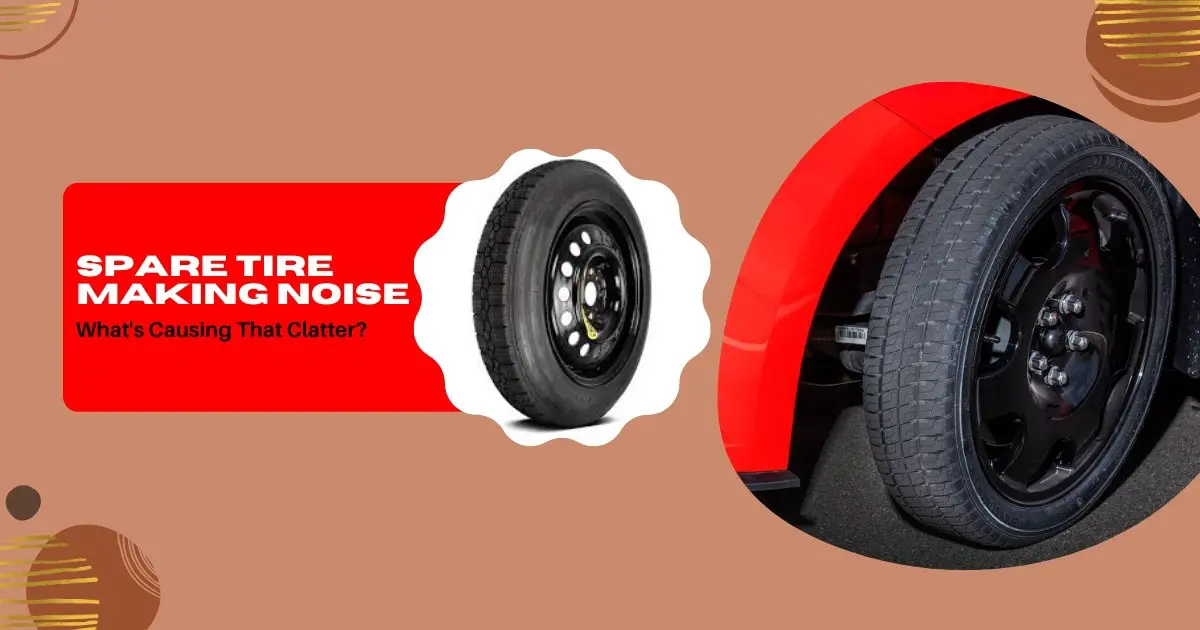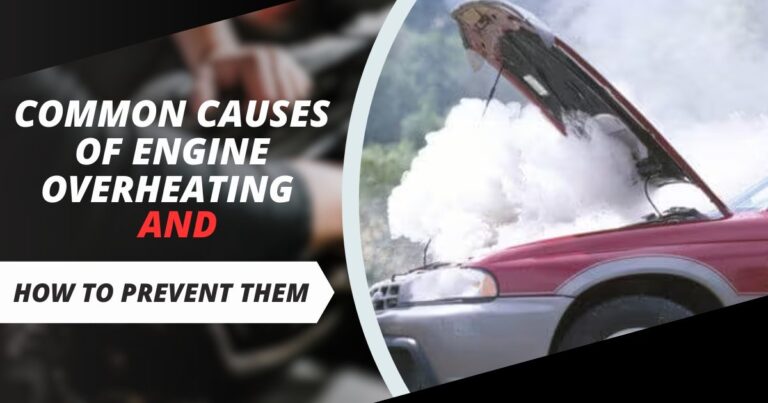Spare Tire Making Noise- What’s Causing That Clatter?
A spare tire is an essential component of any vehicle. The tire helps provide a temporary solution in the event of a flat tire or other tire-related emergencies. However, it’s not uncommon for spare tires to make noise while driving, which can be quite disconcerting for drivers. The sound of a spare tire making noise can range from a humming or buzzing sound to a loud thumping or rattling noise.
In some cases, the noise may be a sign of a serious problem, but in most cases, it is often a minor issue that you address easily. Understanding the causes of spare tire noise and how to solve them is important for any driver who wants to ensure a safe and smooth driving experience.
In this article, we will explore the potential reasons behind a spare tire making noise, the possible risks associated with these noises, and the steps you can take to address the issue.

Why is My Spare Tire Making Noise?
Experiencing unusual noises coming from your spare tire while driving can be both alarming and inconvenient. A spare tire, although not meant for continuous use, should always remain silent and unobtrusive when in use.
However, if you find yourself wondering, “Is it normal for a spare tire to make noise?” then you’re not alone. Generally, a spare tire can make noise while driving for several reasons. Some of the most common causes include;
Loose spare tire
The most obvious reason for occasional spare tire noise is a loose tire or one that’s not properly secured. If the spare tire is not properly secured or tightened in its designated position, it can rattle, vibrate, or shift around during motion. This movement can create noise that is noticeable inside the vehicle. The noise may vary in intensity, ranging from a slight buzzing or rattling sound to a more pronounced thumping or banging noise.
Improper inflation
Another factor that can contribute to spare tire noise is improper inflation. If the spare tire is overinflated or underinflated, it can create irregularities in the tire’s shape and cause it to produce annoying noise while rotating.
For instance, when a spare tire is overinflated, it becomes rigid and may not have enough flexibility to absorb road imperfections. This can result in a harsher ride and cause the tire to generate more noise as it makes contact with the road surface.
On the other hand, if the spare tire is underinflated, its shape becomes distorted, and the sidewalls may flex excessively. This can lead to increased friction and heat generation, which can make the spare tire sound weird as it rotates.
Tread wear or damage
The tread of a tire is designed to provide grip and traction on the road surface. Over time, as the tread wears down or becomes damaged, it can lead to changes in the tire’s performance and generate unusual noise.
When the tread on a spare tire becomes worn out, it may no longer provide adequate traction. This can result in decreased stability and increased rolling resistance, causing the tire to produce noise as it interacts with the road surface.
Similarly, if the spare tire has suffered damage, such as cuts, bulges, or punctures, it can affect its structural integrity and lead to noise. Damage to the tire can also disrupt the even distribution of forces and cause vibrations and noise while driving.
Wheel alignment issues
Wheel alignment itself may not cause noise from the spare tire directly, but it can indirectly contribute to noise-related issues. Wheel alignment refers to the proper adjustment of the angles at which the wheels are positioned in relation to each other and the vehicle. When the wheels are not properly aligned, it can result in uneven tire wear, vibrations, and handling problems.
If your regular tires have alignment issues, it can lead to uneven wear patterns. Similarly, if you’re planning to use a spare tire that has different wear characteristics or tread depth from the regular tires, it can also create an imbalance and result in noise. The uneven wear on the regular tires can also affect the overall stability and smoothness of the vehicle, which may indirectly impact the spare tire’s performance and generate noise.
Suspension problems
Suspension problems also can contribute to a spare tire making noise while driving. The suspension system of a vehicle plays a crucial role in maintaining stability, absorbing shocks, and providing a smooth ride. When there are issues with the suspension components, it can indirectly affect the spare tire and result in noise.
For instance, suspension problems, such as worn-out or damaged shocks, struts, bushings, or control arms, can cause excessive vibrations and instability. If these vibrations are transmitted to the spare tire it can lead to noise while driving. Additionally, if the suspension components are not functioning properly, it can result in uneven weight distribution on the tires, causing irregular tire wear and thereby generating noise.
Improper spare tire size or type
Last but not least using an improper spare tire size or type can also lead to the spare tire squeaking or making other weird noises. Ideally, using a spare tire that is a different size from the other tires on the vehicle can lead to imbalances in the rotational speed, circumference, and overall performance. This can cause the spare tire to generate noise as it rotates at a different rate compared to the other tires.
Additionally, using a spare tire that is not the correct match for the vehicle, such as a different tread pattern or construction, can also result in noise due to uneven traction and handling characteristics. As such, it is crucial to check that the spare tire is the appropriate size and type for your vehicle.
Possible Risks of Spare Tire Making Noise
While a spare tire making noise may not always indicate a serious issue, it is important to address the underlying cause promptly to avoid potential risks. Some possible risks associated with a noisy spare tire include;
- Decreased stability- If the spare tire is loose, improperly inflated, or experiencing other issues, it can affect the stability of the vehicle. This can lead to compromised handling and an increased risk of accidents, especially during sudden maneuvers or emergencies.
- Tire failure- Noise from the spare tire could indicate significant wear, damage, or structural issues. Continuing to drive on a compromised spare tire can increase the risk of tire failure, such as blowouts or tread separation. These events can lead to loss of control, accidents, and potentially dangerous situations, particularly at higher speeds.
- Compromised traction- If the spare tire has inadequate tread depth or is not the right type for the driving conditions, it may result in reduced traction. This can lead to poor braking performance, decreased handling capabilities, and an increased risk of skidding or hydroplaning, particularly in adverse weather conditions.
- Additional damage-In some cases, a spare tire making noise could be indicative of underlying issues with the vehicle’s suspension, alignment, or other components. Ignoring these problems and continuing to drive can cause further damage to the vehicle and its systems, leading to costly repairs down the line.
- Driver distraction-Excessive noise from the spare tire can be distracting and affect the driver’s focus and concentration. This distraction can increase the risk of accidents or hinder the driver’s ability to respond effectively to road hazards or sudden changes in traffic conditions.
How to Fix Spare Tire Making Noise
Tighten the spare tire- If you suspect that your spare tire is loose, it’s important to have it checked and secured properly as soon as possible to prevent further issues and ensure a safe driving experience. If the spare tire is loose, you can tighten it using a lug wrench or tire iron. Make sure to tighten the lug nuts to the recommended torque, as specified in the vehicle’s manual.
Inflate the tire properly-It is also critical to ensure that the spare tire is inflated to the recommended pressure level specified by the vehicle manufacturer. Checking the tire pressure regularly and maintaining the correct inflation can also help minimize noise and ensure optimal performance of the spare tire.
If the spare tire is underinflated or overinflated, ensure to inflate it to the recommended pressure. You can always find the recommended pressure in the vehicle’s manual or on the tire sidewall.
Check the tread wear-Inspecting the spare tire regularly for signs of tread wear or damage can also help fix a spare tire making humming noise. If the tread depth is too low or there are visible signs of damage, it is recommended to replace the spare tire to ensure safe and quiet driving.
Use a compatible spare tire-Ensure that the spare tire matches the specifications recommended by the vehicle manufacturer. If the spare tire is not a proper match, it is always a good idea to replace it with a compatible spare tire that matches the specifications outlined by the vehicle manufacturer. Ideally, using the correct spare tire will help ensure optimal performance, minimize noise, and maintain safe driving conditions.
Check suspension components-Inspect the suspension system for worn-out or damaged shocks, struts, bushings, or control arms. If you identify any problems, have them repaired or replaced by a qualified mechanic.
By maintaining a well-functioning suspension system, you can minimize vibrations and noise, ensuring a smoother and quieter driving experience, including when using the spare tire.
Get wheel alignment- While wheel alignment itself may not directly cause noise from the spare tire, it’s important to ensure that the regular tires and the spare tire are properly aligned. This helps maintain overall vehicle stability, reduces vibrations, and ensures proper performance of all tires, including the spare tire.
Reduce speed- If the spare tire is generating noise due to uneven wear or size, driving at a lower speed can help minimize the noise until the tire is replaced.
Frequently Asked Questions
Is a spare tire supposed to make noise?
One of the most frequently asked questions is “Do spare tires make noise?” Ideally, a spare tire itself is not designed to make noise. It is intended to be safe, reliable, and offer a comparable performance to regular tires. However, spare tires may differ from regular tires in terms of tread design, size, and construction. As a result, some minimal noise or differences in ride comfort may be experienced when using a spare tire.
Why is my spare tire making a grinding noise?
If your spare tire is making a grinding noise, one possible reason could be that the spare tire itself is faulty or damaged. For instance, it could have a structural issue, such as a damaged belt or internal separation, causing the spare tire make noise when turning or rub against other components as it rotates. This can result in a grinding noise.
Also Read: Why is the Windshield Making Popping Noise?
Conclusion
A spare tire making noise while driving can be a cause for concern. While it may not always indicate a serious problem, it is important to address the underlying cause to ensure safe and comfortable driving conditions. By identifying the underlying cause early enough, you can take the necessary steps to resolve the noise and ensure your driving experience remains safe and hassle-free.






